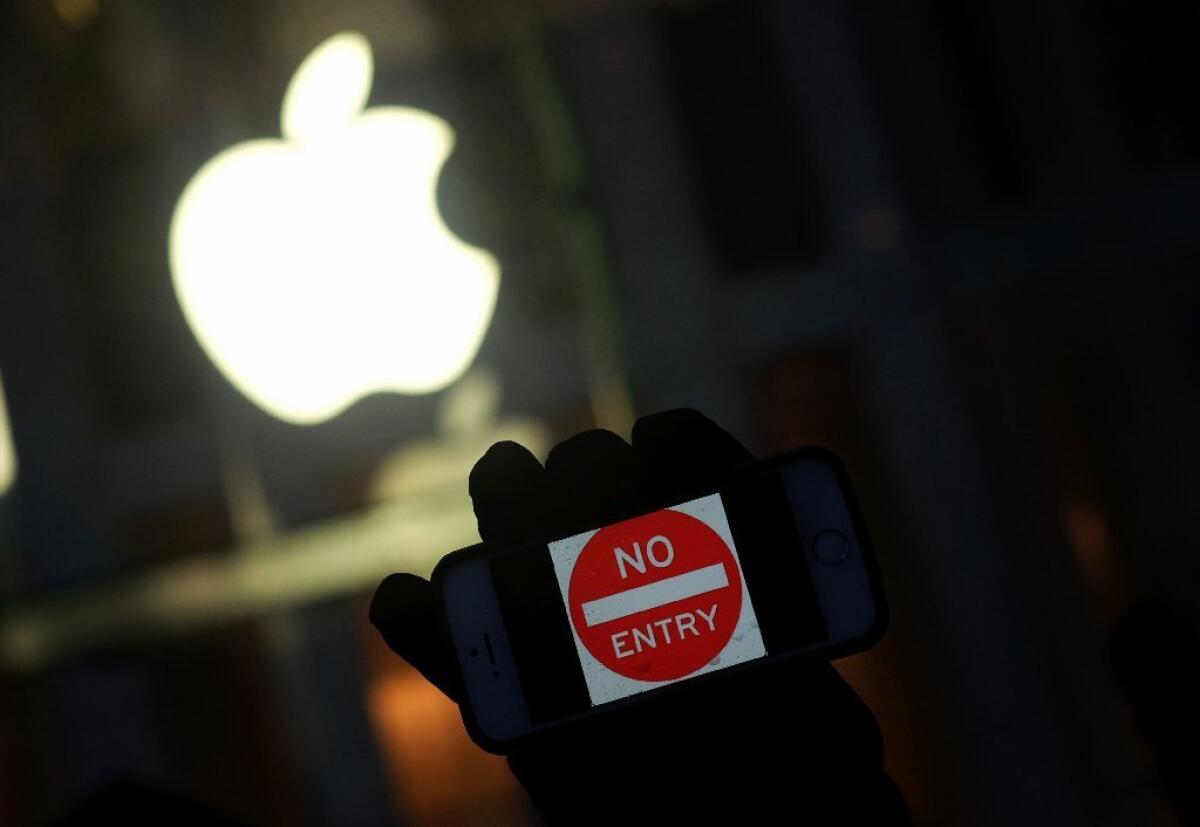FBI vs. Apple: How both sides were winners and losers

An antigovernment protester holding his iPhone with a sign “No Entry” during a demonstration in New York.
- Share via
In a dramatic turn of events Monday, the FBI dropped its case against Apple Inc. after the federal agency said it found a way to gain access to Syed Rizwan Farook’s iPhone 5c without the tech giant’s help. That ended a heated faceoff that highlighted the growing tensions between law enforcement and the technology industry.
Here’s how both sides won and lost:
Legal precedent
Winner: Apple
The last thing the iPhone-maker wanted was to set a precedent that allowed law enforcement to force tech companies to undermine their own security. By fighting the FBI’s push to compel Apple engineers to write software that would circumvent Farook’s passcode, Apple Chief Executive Tim Cook framed his company as taking a principled fight for privacy in the digital age. With Monday’s news, Apple keeps its principles intact and sends a message that it will stand up for customer security.
Loser: FBI
The agency gambled that the San Bernardino terrorist attack, which resulted in the slaughter of 14 people, would swing popular opinion and force Apple and other tech firms to cooperate more with law enforcement when it comes to encryption. That wager failed and the FBI’s credibility took a hit when it insisted Apple was the only organization that could unlock Farook’s phone -- only to later admit an outside party had achieved the feat.
Cracking the iPhone
Winner: FBI
Forget for a second that this was a clash of ideals over privacy and national security. The FBI ultimately succeeded in gaining access to a valuable piece of evidence in a case that represents the worst terrorist attack on U.S. soil since Sept. 11. Information on the phone could help identify co-conspirators and answer other open questions about the attack.
Loser: Apple
The iPhone was supposed to be a paradigm of security. Now, the FBI is sitting on a vulnerability that apparently defeats Apple’s security measures. That could ultimately hurt Apple’s bottom line if consumers begin to take privacy more seriously as a result of the high-profile case. Moreover, Apple is probably desperate to know how the FBI cracked Farook’s passcode. And there’s no guarantee -- and perhaps little likelihood -- the government will reveal to the company how it did it.
Public perception
Winner: Apple and FBI
Apple stood firm in the face of legal threats, framing the company as a protector of privacy rights. That may reassure domestic customers, but it could also have a major impact overseas. China is Apple’s most important growth region, set to become its biggest market in the near future. The company’s business and relationship with regulators there would be significantly strained if it was forced to provide special access for U.S. agents to its hardware. Though China loves the iPhone, its leaders are deeply suspicious of American technology and fear they could be accessed by U.S. spies.
By cracking Farook’s phone, the FBI puts criminals and terrorists on notice. Sure, it was messy, but the feds eventually got into the iPhone -- suggesting technology won’t stand in the way of investigations.
Long-term victor
Winner: Unclear
This fight between the world’s biggest company by market cap and federal law enforcement likely won’t be the last of its kind. For tech companies, there’s one clear takeaway: Security can never be strong enough. And for investigators, the case will only reinforce the push for a bigger digital crime-fighting toolbox. Expect an arms race in encryption tools that will continue to frustrate law enforcement -- perhaps until legislation sets guidelines for both sides.
Follow me on Twitter: @dhpierson







